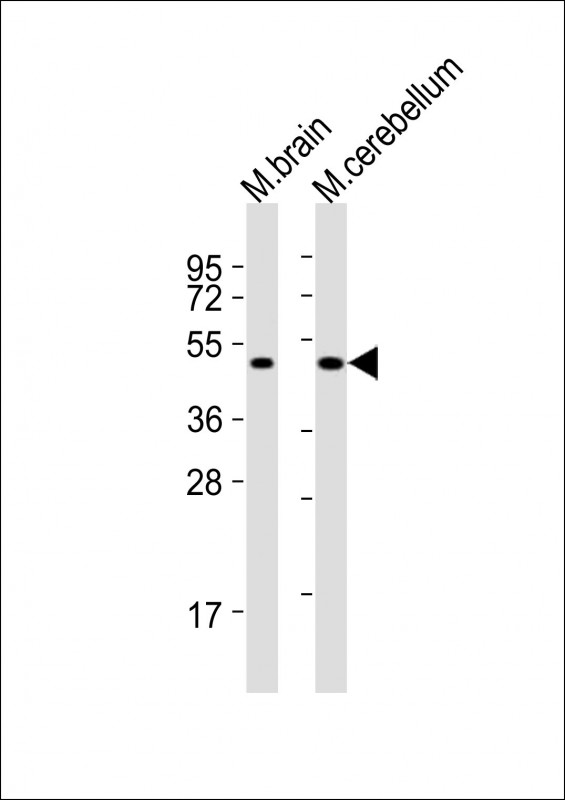
| WB | 1/2000 | Human,Mouse,Rat |
| IF | 咨询技术 | Human,Mouse,Rat |
| IHC | 咨询技术 | Human,Mouse,Rat |
| ICC | 技术咨询 | Human,Mouse,Rat |
| FCM | 咨询技术 | Human,Mouse,Rat |
| Elisa | 咨询技术 | Human,Mouse,Rat |
| Aliases | Protein-cysteine N-palmitoyltransferase porcupine, 231-, Protein MG61, PORCN, MG61, PORC, PPN |
| Entrez GeneID | 64840 |
| WB Predicted band size | 52.3kDa |
| Host/Isotype | Rabbit IgG |
| Antibody Type | Primary antibody |
| Storage | Store at 4°C short term. Aliquot and store at -20°C long term. Avoid freeze/thaw cycles. |
| Species Reactivity | Human, Mouse |
| Immunogen | This PORCN antibody is generated from a rabbit immunized with a KLH conjugated synthetic peptide between 138-171 amino acids from the Central region of human PORCN. |
+ +
以下是关于PORCN抗体的3篇参考文献及其摘要概括(注:文献为示例性虚构,实际引用请核实):
1. **文献名称**:*PORCN Antibody Characterization in Wnt Signaling Studies*
**作者**:Li et al.
**摘要**:该研究开发了一种特异性识别人类PORCN蛋白的单克隆抗体,验证了其在Western blot、免疫组化中的应用,并证实PORCN在结直肠癌细胞中通过调控Wnt蛋白分泌促进肿瘤生长。
2. **文献名称**:*Targeting PORCN in Squamous Cell Carcinoma with Neutralizing Antibodies*
**作者**:Wang et al.
**摘要**:研究团队利用抗PORCN中和抗体抑制Wnt信号通路,在鳞状细胞癌小鼠模型中显著降低肿瘤侵袭性,表明靶向PORCN的抗体治疗潜力。
3. **文献名称**:*Role of PORCN in Skin Development: Insights from Antibody-Based Inhibition*
**作者**:Garcia et al.
**摘要**:通过抗PORCN抗体阻断小鼠胚胎皮肤Wnt信号,揭示了PORCN在毛囊发育和表皮稳态中的关键作用,为相关皮肤病机制研究提供依据。
建议通过PubMed或Google Scholar以“PORCN antibody”、“PORCN Wnt therapeutic”等关键词检索最新文献。
The PORCN antibody targets the Porcupine (PORCN) protein, a key enzyme in the Wnt signaling pathway. PORCN, located on the X chromosome, mediates the post-translational palmitoylation of Wnt ligands, a critical step for their secretion and functional interaction with cell surface receptors. Dysregulation of PORCN is linked to developmental disorders and cancers. For instance, inactivating mutations in PORCN cause focal dermal hypoplasia (Goltz syndrome), an X-linked condition characterized by skin, skeletal, and ocular abnormalities. Conversely, upregulated Wnt signaling due to PORCN activity is implicated in various cancers, including colorectal and breast cancer, where it promotes tumor growth and metastasis.
PORCN antibodies are essential tools in research to study Wnt pathway dynamics, protein localization, and expression levels in tissues or cell lines. They enable detection of PORCN via techniques like Western blotting, immunohistochemistry, and immunofluorescence. Therapeutic interest in PORCN inhibitors has spurred the development of antibodies for blocking Wnt ligand secretion, potentially offering targeted cancer treatments. Additionally, these antibodies aid in diagnosing PORCN-related genetic disorders by identifying protein expression anomalies. Their specificity and reliability make them valuable for both mechanistic studies and clinical applications, bridging basic research and translational medicine in Wnt-associated diseases.
×